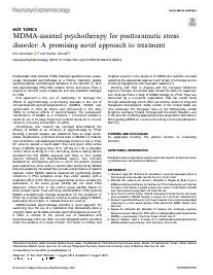MDMA-assisted psychotherapy for posttraumatic stress disorder : A promising novel approach to treatment
Posttraumatic stress disorder (PTSD) treatment guidelines have unequivocally designated psychotherapy as a first-line treatment, despite well-documented neurobiological alterations in this disorder [1]. Even with psychotherapy, PTSD often remains chronic and severe. There is urgency to discover novel compounds and new treatment strategies for PTSD.
One approach is the use of medication to leverage the effects of psychotherapy. A promising example is the use of 3,4-methylenedioxymethamphetamine (MDMA). MDMA was synthesized in 1912 by Merck and discovered in the early 1970s to enhance effects of psychotherapy. The subsequent classification of MDMA as a Schedule 1 controlled substance made its use in therapy illegal and created obstacles to clinical
research, including assessment of safety.
Nonetheless, new research has emerged demonstrating the efficacy of MDMA as an enhancer of psychotherapy for PTSD. Recently, a pooled analysis was published from six small randomized, double-blind, controlled clinical trials of MDMA [2]. Patients were enrolled to manualized psychotherapy sessions in two or three 8 h sessions, spaced a month apart. They were given either active doses of MDMA ranging from 75 to 125 mg (n=72) or placebo/control doses 0–40 mg (n=31). Non-drug sessions lasting 90min preceded the first MDMA exposure and three to four weekly sessions following the drug-facilitated session. Two clinicians
facilitated an introspective process in which the patient revisited past experiences while under a mental state produced by MDMA that presumptively minimized fear, arousal, and avoidance of painful material. Under MDMA, patients experienced significantly greater reductions in PTSD symptom scores than under placebo, with a treatment effect of 0.8. After two experimental sessions, double the participants in the active group (54.2%) did not meet PTSD diagnostic criteria than in the control group (22.6%). Based on these pooled results Food and Drug Administration (FDA) granted MDMA a breakthrough therapy designation for the treatment of PTSD. Yet, it will be important to continue to assess safety of MDMA, particularly when higher or multiple doses are used [3].
MDMA-assisted psychotherapy provides a novel approach for examining how the use of a medication that dramatically alters a cognitive state can facilitate a deeper psychotherapeutic process [4]. It offers a contrast to the current use of medications and psychotherapy, which are often not well integrated and/or provided under the auspices of a single clinician. The fewer in number, but lengthier sessions in the presence of MDMA also redefine concepts regarding the appropriate approach and length of a therapy session involving engagement with traumatic material [5]. Working with FDA in America and the European Medicines Agency in Europe, the pooled data formed the basis for expansion into multi-site Phase 3 trials of MDMA therapy for PTSD. These are sponsored by a non-profit organization that has raised funds through philanthropy, which offers yet another model of drug and therapeutic development. Study centers in the United States are now underway. The European sites—in the Netherlands, United Kingdom, Germany, Finland, Portugal and the Czech Republic—are in the process of seeking approvals and are projected to start later in 2019, putting MDMA on course to becoming a licensed treatment in 2021 [6].
Geachte bezoeker,
De informatie die u nu opvraagt, kan door psychotraumanet niet aan u worden getoond. Dit kan verschillende redenen hebben,
waarvan (bescherming van het) auteursrecht de meeste voorkomende is. Wanneer het mogelijk is om u door te verwijzen naar de bron
van deze informatie, dan ziet u hier onder een link naar die plek.
Als er geen link staat, kunt u contact opnemen met de bibliotheek,
die u verder op weg kan helpen.
Met vriendelijke groet,
Het psychotraumanet-team.
In: Neuropsychopharmacology ; ISSN 0893-133X ; eISSN 1740-634X | 45 | january | 231-232
https://doi.org/10.1038/s41386-019-0482-9


